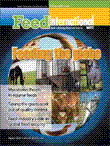Agriculture both affects and is affected by climate change due to the increase in greenhouse gas the climate is producing, speakers said at a lively debate at the World Agricultural Forum in St. Louis May 20.
Speakers debated how, or even if, agriculture can be part of the solution to global warming in a session called “Climate Change: Impacts on Food Security.”
“Agriculture is not at the table (at the global debate on climate change that will occur this fall in Copenhagen),” said moderator Carole Brookins, former U.S. representative to the World Bank.
"How do we make agriculture part of the solution?” she asked.
Livestock is very vulnerable to climate change, said Dr. Frank M. Mitloehner, air quality extension specialist at the University of California-Davis.
During a recent hot summer, 30,000 dairy cows died in California in one week, and one of the state’s largest dairy herds saw productivity fall by one third. California is the largest U.S. milk producing state. Livestock is affected by the variability in climate, he said.
Mitloehner said the recently published figure which stated that livestock is responsible for 18% of global warming is “very controversial and cannot be applied regionally.”
For example, he said, the bulk of the 18% is due to deforestation in developing countries, while livestock in developed countries are only a small contributor to global warming. He noted that in the U.S., forested land has actually increased in recent years. Furthermore, he noted that methane production from cows has been decreased dramatically since the 1940s due to increases in productivity.
Mitloehner is critical of consumers who want safe technologies banned that increase livestock efficiency, such as rBST for cows. In addition, organic systems may contribute more to global warming, Mitloehner said.
He said through the use of methane digesters, which are increasing in use, methane can be captured and used to make electricity and natural gas.
Professor Alan Buckwell, director of the Country Land and Business Association of the United Kingdom, said agriculture is hurt by climate change. Specifically, he said, climate change above 2% creates heat stress for plants and animals and spreads diseases for both. He also said it’s a “gigantic challenge,” but agriculture has to learn how to reduce its production of methane and nitrous oxide, which contribute to greenhouse gases.
It’s a very complex issue, he said, and “we do not have good measurement tools.”
In addition, he and other panel members said it’s very difficult to control the behavior of millions of independent farmers. Right now, he said, “agriculture is not part of the solution, and we better face that.”
One piece of the solution is to boost efficiency of plants, which results in fewer emissions, said Dr. Jerry Hatfield, director of the USDA-ARS National Soil Tilth Laboratory in Ames, Iowa. He added, however, that making plants more resistant to climate change “doesn’t get quite the press.”
Particularly affected by climate change will be the world’s poor, which are disproportionately concentrated in Africa.
“By 2080 it’s a terrible picture for the world’s poor,” said Frank Tugwell, president and CEO of Winrock International.
Many areas of Africa will “not be very inhabitable,” he said, which presents “a catastrophic picture.”
One of the major problems in reversing climate change trends, he said, is that democratic societies are not very good at dealing with long-term problems.
Michael Walsh, executive vice president, the Chicago Climate Exchange (CCX), said despite a dire picture, positive developments are taking place within agriculture. For example, 20 million acres in the U.S. and Canada have enrolled in the CCX, in which farmers agree to management practices that sequester carbon in the soil in exchange for payments.
“There is reason for optimism,” he stated.
Walsh added that, in time, it may be possible that agriculture is 5% part of the solution, and as much as 20% of net ag income may come from programs such as those offered by the CCX. Livestock producers may also participate in CCX programs by reducing methane output.
“We won’t take ag emissions to zero, but we can improve,” Hatfield said.
Farmers can “drastically change” nitrogen emissions, he added. Some panellists were concerned, however, that at the same time farmers in developed nations reduce their emissions, farmers in developing nations may increase them by adopting more efficient production practices with more fertilizer and other inputs.
Some said through proper development, farmers in developing nations may be able to concentrate production on the highest-producing soils, thus reducing their carbon footprint. The panelists also debated whether reduced tillage and no-till actually reduces or increases carbon emissions.
Europe does not allow farmers to receive credit for carbon sequestration for no-till because of the view that it may increase carbon emissions. Some panelists, however, took the strong view that no-till reduces a farmer’s carbon footprint.
Panellists also debated whether incentives will be enough to change the behavior of millions of farmers or whether mandatory incentives will be necessary.
“It’s better to produce incentives,” Tugwell said, while Buckwell countered with: “I don’t think we know enough about incentives.”
















